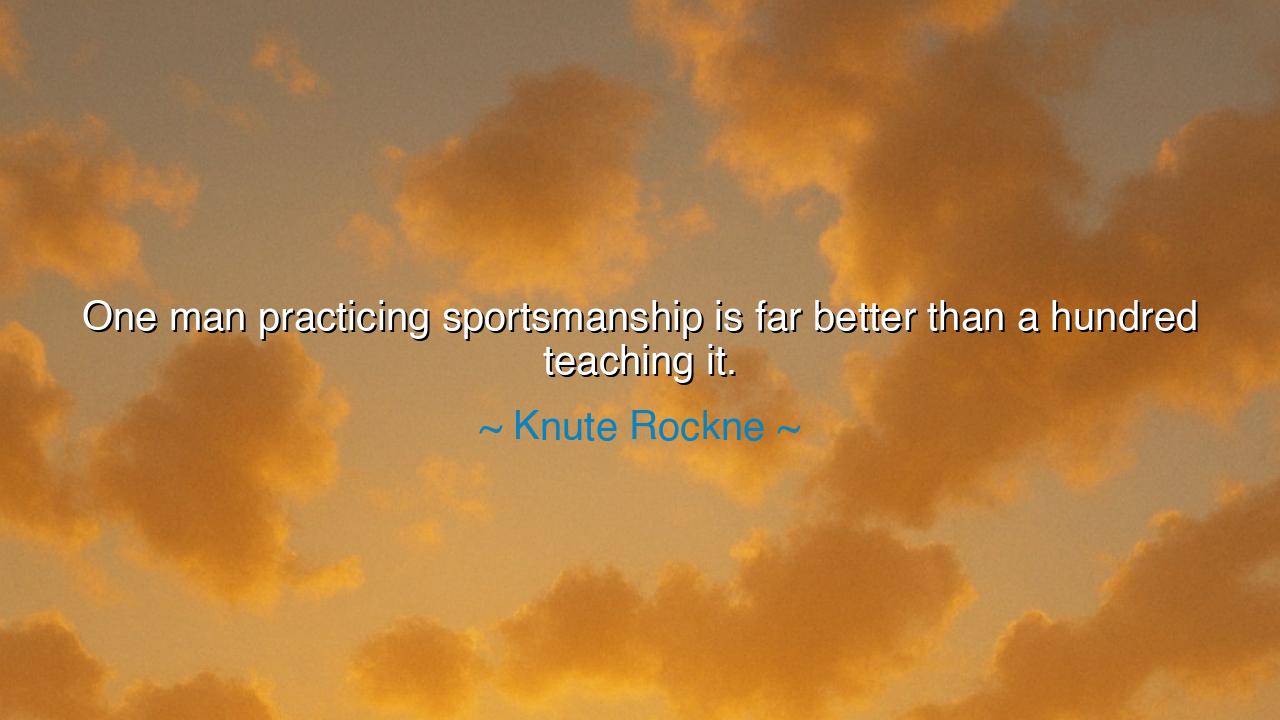
One man practicing sportsmanship is far better than a hundred






In the fields of glory, where men have clashed in strength and cunning, the voice of Knute Rockne, the immortal coach of Notre Dame, still thunders across the ages. With clarity born of battle and wisdom shaped in triumph and defeat, he declared: “One man practicing sportsmanship is far better than a hundred teaching it.” This is not a simple maxim about games, but a law of life itself—a call to action, a summons to integrity, a reminder that deeds outweigh words.
For sportsmanship is not a doctrine to be recited, nor a lesson to be spoken from pulpits of authority. It is a spirit, living and breathing, that must be practiced to be real. A hundred men may speak eloquently of fairness, honor, and humility, but their words vanish like mist if no one lives them. Yet when a single man embodies these virtues—when he shows grace in victory, dignity in defeat, and honor in every contest—his example teaches more powerfully than volumes of lectures. Thus Rockne calls us to live, not merely to preach.
The ancients knew this truth well. Recall the tale of Marcus Aurelius, the Roman emperor and philosopher. His writings on virtue and justice endure, but it was not his words alone that inspired the legions—it was the way he lived them. In plague, in war, in the endless trials of empire, he carried himself with humility and patience. One man practicing virtue taught more than a hundred philosophers declaring it. In the same way, one athlete who bows to his rival in respect teaches more about sportsmanship than a chorus of coaches lecturing from the sidelines.
Rockne himself was no stranger to this law. As a leader of young men, he knew that speeches alone could not carve character into the heart. His players watched him, saw how he lived, how he demanded discipline from himself before he demanded it from them. His example forged loyalty, courage, and unity far more than his words. He embodied the very truth he proclaimed: that practice of virtue outshines the teaching of it.
Consider too the tale of Jackie Robinson, who broke baseball’s color barrier. Many preached about equality, many spoke of fairness, but it was Robinson’s practice of restraint and courage on the field—enduring insults, hatred, and violence without breaking—that taught the world more about dignity than a hundred sermons could have. One man, by living sportsmanship, accomplished what legions of voices alone could not.
The lesson for us is clear: do not be content to speak of honor, fairness, or kindness—practice them. Do not wait for others to set the example—be the one whose actions shine. When you face conflict, let your conduct speak louder than your tongue. When you achieve victory, wear humility as your crown. When you are defeated, accept it with dignity, teaching others by the grace of your endurance. For a single deed of virtue can inspire generations, while empty words fade like whispers in the wind.
So let the words of Knute Rockne be handed down as eternal counsel: “One man practicing sportsmanship is far better than a hundred teaching it.” In your life, do not aspire merely to instruct, but to embody. Do not seek only to persuade with speech, but to convince with action. For it is in living truth, not speaking it, that we shape the hearts of others. And remember, the world may not heed the words of the hundred, but it cannot ignore the witness of the one.






AAdministratorAdministrator
Welcome, honored guests. Please leave a comment, we will respond soon